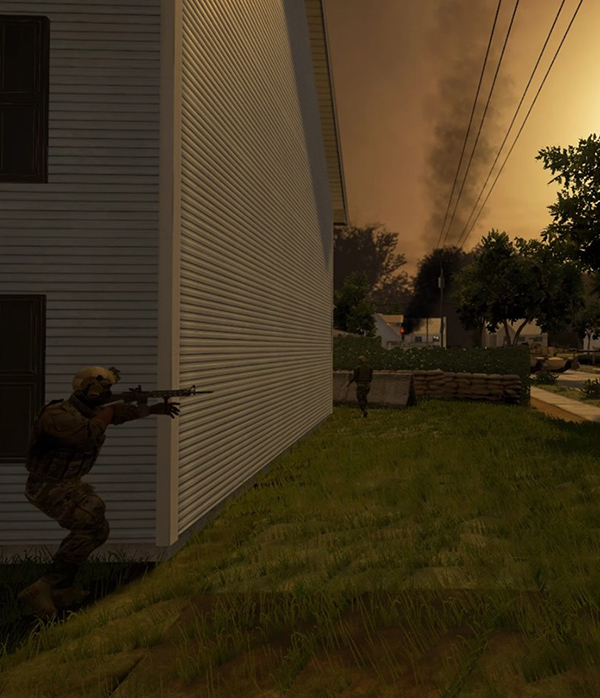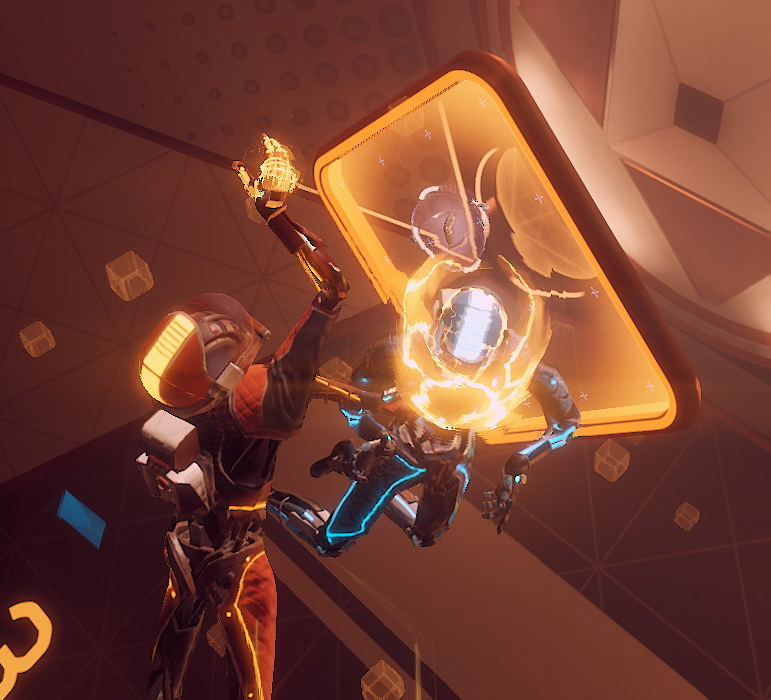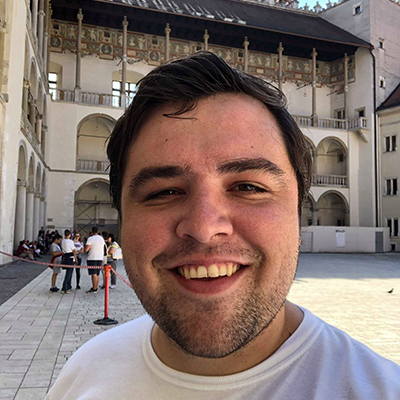Bradley Lynch was nervous. It was April 2016, and he was in the News 6 studio in Orlando to film a segment for an upcoming broadcast. Lynch had been running his own YouTube channel for some time, so it wasn’t the prospect of being on camera that had him on edge. No, he was nervous because he didn’t want to mess up a rare chance to showcase the magic of virtual reality to viewers his videos didn’t usually reach.
“I had some prototype equipment and I wanted to help introduce VR to a mainstream audience,” Lynch told me over video chat in October of last year. “I thought hey, I can introduce VR to a lot of people who probably wouldn’t see it for a number of years. VR was young and wasn’t known well. I partnered with the news station to demo a few of the experiences I had.”
The news segment showed off a prototype version of the Vive, an HTC-built headset that Lynch had gotten his hands on early after winning a contest. He had some of the station’s anchors and reporters test out some short demos. The news crew got to live out every gamer’s fantasy: hitting tennis balls directly into the sky and walking into the green screen with their headsets on. It’s clear these newscasters didn’t have much gaming experience, but all of them still walked away impressed, raving about the time they spent with the Vive.
For Lynch, the segment was part of his mission, still ongoing fours years later, to spread the word about the awesome potential of virtual reality. What he didn’t know at the time was how far VR would eventually take him.
Three years later, Lynch returned to News 6 to talk about his trip to Xi’an, China, where he competed in and won an invitational tournament for Phaser Lock Interactive’s Final Assault at the World Cyber Games, an event colloquially known as the Esports Olympics.
“The VR stage was one of the smaller sections of the overall tournament,” Lynch told me of his time in China. “But on the final day people were there. It was crowded, and they were into it. I didn’t even realize how many people were cheering until I took my headset off.”
“It was a mixed-reality stage. Each player had a perspective view wrapped around them,” he said. “I’ve been doing mixed reality for a while so I’m numb to it, but fans got to see us interact with this world. They got to see our movements translate in real time.”
Bradley Lynch’s story as an evangelist turned competitor is a common one in VR esports. He’s part of a small community of mostly grassroots organizers and players who compete in games like the first-person shooter Onward, the zero-gravity sports game Echo Arena, and the real-time strategy focused Final Assault on a regular basis.
The scene is still quite small, much like the rest of the virtual reality industry. It’s made up of a hodgepodge of different tournament series, game studios, and several hundred players that take part because they love VR. Passion and a little hope drive the people that make the community-run VR Masters League and the ESL-run VR League possible. While there may be money from Oculus and well-known developers like Ready at Dawn floating around, the majority of what makes competitive VR tick comes from the bottom up.

Credit: Downpour Interactive
“The VR Masters League started with Onward about three years ago,” VR Masters League organizer DaKinMan told me over Discord. “Onward was all hyped up when it came out [in 2016] and we started holding tournaments on weekends. We really enjoyed playing competitively and we were looking to find more structure in how we set things up. Myself and two others started putting this together.”
DaKinMan created a website to help run special VR tournaments with a ladder structure instead of the typical competitive bracket structure. “The VR Master League runs on a ladder system, meaning teams play every week and they have matches set up for them based off their rank,” DaKinMan said. “New teams play new teams, and veterans play veterans. This engages the community and lets them have a fun match, [since] new teams wouldn’t go against top teams.”
A ladder tournament structure is unique, as few other competitive sports or esports make use of the model. The VR Masters League uses it to promote growth in its community and in the greater VR industry, rather than focusing primarily on competition. The League also gears its broadcasts toward new players in order to make them feel welcome. Like Lynch, the organizers consider themselves evangelists for VR as a platform.
The VR Masters League hosts tournaments for Onward, Final Assault, first-person shooters Pavlov VR and Contractors, and Ubisoft’s Space Junkies, with hundreds of players participating in the largest contests. The platform is also used by other games, including Ready at Dawn’s Echo Arena and many smaller titles.
“If you encourage people to play in a more competitive atmosphere and they enjoy doing that then they’ll spend more time in the game,” league moderator and caster Brad “SL33PY” Atkins said. “They then might recommend it to their friends. For games like Space Junkies, whose developer stopped official development on the game, we’re like life support.”
The VR Master’s League is as tight-knit as communities get. It isn’t streaming to hundreds of thousands of viewers or caught up in huge Discord channels. It’s filled with passionate people who know one another and want to help their community and platform grow. In some respects, these organizers and players aren’t too different from the passionate developers making the games used to compete.
“We’re really tight-knit with the community. Our game wouldn’t be what it is without them. We embrace the grassroots nature of it,” said Ready at Dawn lead designer Eric Hankins. The studio partners with both the ESL VR League and the VR Masters League to host tournaments and build the community around Echo Arena, an arena sports game where players float around in zero gravity trying to score goals on the opposing team.
“As we did our initial betas, we really started to see what the game was capable of,” Hankins said, noting that the studio realized Echo Arena‘s competitive potential early. “As we saw people playing in the betas, we started to see hardcore meta games evolve. It was very natural with how many players starting playing at that level.”
Ready at Dawn started listening early to its competitive playerbase to get feedback, and even built an in-game spectator system long before the first tournament. The studio knew the game would bring in high-level players, so it wanted to start organizing on the ground level. “We had the interest early on before the community built around it,” Ready at Dawn co-founder Ru Weerasuriya said. “We’re lucky that the community responded. They’ve done things better than we could’ve done ourselves.”
Weerasuriya mentioned that VR’s unique spectating experience and physicality—players can build up a sweat while running around during a tournament—make for a different kind of esport compared to games like League of Legends or Counter-Strike. “We talk about how spectating is one of the magical things that happens in VR,” he said. “There is something about VR spectating that makes it special. You are the camera, you are there. You’re inside the match.”
Other VR titles, like Onward, also have high quality spectating modes that tournament organizers and casters use to capture the best bits of action. It makes spectating VR—which can also be done within VR—unlike anything in other esports.
While a majority of the players, community organizers, and fans that are part of the competitive VR community take part because of their passion, there are a few groups who believe VR esports has a bright future ahead of it and they want to position themselves early.
“Especially with something new like this that has a potentially bright future, the one thing for us was to be at the grassroots of it,” Ready at Dawn CFO Mark Almeida told me. “We want to be there for the revenue stream, and we also felt that the learning process would give us insight into what would matter long term.”
While Almeida believes that there has been a large readjustment to the expectations for the virtual reality industry, he still believes competitive VR will grow alongside the broader VR and esports industries. It’s one of the reasons Ready at Dawn jumped in to be part of the Oculus-funded, ESL-run VR League.

Credit: Ready at Dawn Studios, Oculus Studios
The VR League started in 2017 with Echo Arena and The Unspoken and has gone through three seasons and one rebranding since then. The third and most recent season touted a $250,000 prize pool and competition across four games with finals in Leicester, England, in June of 2019.
“Short term, we want to help foster competition around virtual reality. We’ve seen titles that have a high-level quality of play, and as developers bring more to their games the community evolves. We want to help facilitate that and work with companies like Oculus to ensure it’s something that continues to grow,” ESL’s Sean Charles told me. “Long term, we see that this will, as the install base increases, gather momentum.”
The VR League has hosted tournaments for a variety of games since it was founded, with the lineup changing slightly each season. It’s the biggest stage available to VR competitors, but the focus for the organizers and players is still getting the word out about VR esports in general. “We made a decision early on to be antagonistic with how they play,” Charles said of how the league works with every brand of VR headset. “We want to really open up to how we can build out esports. In the end, we are evangelizing VR.”
Everyone I spoke to, from the community-driven VR Masters League and individual players to big names like ESL, talked about much of their efforts went toward simply advocating for VR as a serious platform. They’re in it to see VR grow and they hope to see the competitions they support now grow into something far larger.
“If you look at how esports have grown from 1998 to now, and then realize it’s only been three years since VR has really gotten going,” Almeida said, “it’s very premature to call something now. And it’s true that it’s a niche, but it’s too early to say it’s not working. We are taking baby steps. Nobody could tell you back in 1998 what esports would turn into, and no one can tell you what VR esports will turn into.”
Header image courtesy of VR League.

Aron Garst is a freelance journalist who covers games and esports for ESPN, Gamasutra, WIRED, Polygon, Kotaku, and plenty of other sites. He has an unhealthy obsession with battle royales and Animal Crossing.